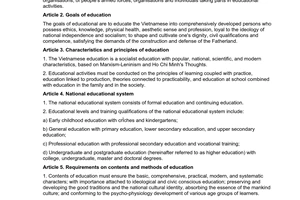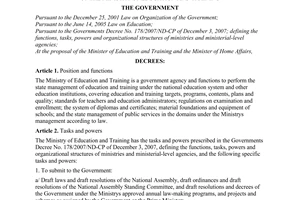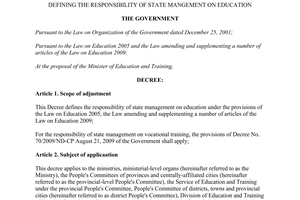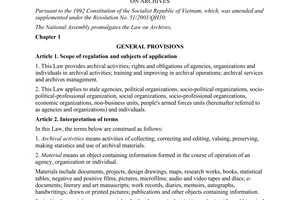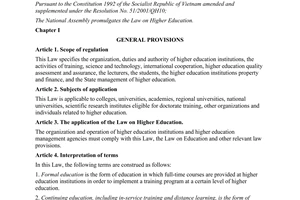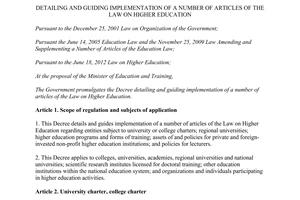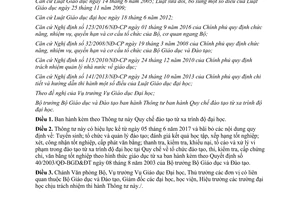Nội dung toàn văn Circular 10/2017/TT-BGDDT regulations on distance education at higher education level
|
Ministry of Education and Training |
SOCIALIST
REPUBLIC OF VIETNAM |
|
No.: 10/2017/TT-BGDDT |
Hanoi, April 28, 2017 |
CIRCULAR
regulations on distance education at higher education level
Pursuant to Law on Education dated June 14, 2005; Law on amendments to a number of Articles of Law on Education dated November 25, 2009;
Pursuant to Law on Higher Education dated June 18, 2012;
Pursuant to Decree No. 123/2016/ND-CP dated September 01, 2016 of Government on functions, tasks, powers, and organizational structure of Ministry and ministerial agencies;
Pursuant to Decree 32/2008/ND-CP dated March 19, 2008 of Government on functions, tasks powers and organizational structure of Ministry of Education and Training;
Pursuant to Decree No. 115/2010/ND-CP dated December 24, 2010 of Government on State Management Responsibility on Education;
Pursuant to Decree No. 141/2013/ND-CP dated October 24, 2013 of Government on elaborating a number of Articles of Law on Higher Education;
At request of Director of Higher Education Department;
Minister of Education and Training promulgates Circular providing regulations on distance education at higher education level (hereinafter referred to as “distance higher education”).
Article 1. Attached to this Circular are the regulations on distance education at higher education level.
Article 2. This Circular comes into effect from June 05, 2017 and annuls provisions for: Academic enrolment; organization and management of training activities; learning outcome assessment and graduation test; graduation eligibility consideration, recognition and degree conferral; inspection, complaint, accusation and sanctions against violations relating to distance higher education under regulations on organization of training activities, examinations, tests, awarding of graduation qualifications for distance education programs attached to Decision No. 40/2003/QD-BGD&DT dated August 8, 2003 of the Minister of Education and Training.
Article 3. Chief of Ministry Office, Director of Department of Higher Education, heads of relevant agencies affiliated to Ministry of Education and Training, directors of universities, academic institutes and rectors of higher education institutes shall be responsible for implementation of this Circular./.
|
|
PP. MINISTER
|
REGULATION
On distance higher education
(Issued together with Circular No. 10/2017/TT-BGDDT dated April 28, 2017 of
Minister of Education and Training)
Chapter I
GENERAL PROVISIONS
Article 1. Scope of regulation and regulated entities
1. These regulations prescribe the distance higher education activities including: academic enrolment and admission, organization and management of distance education activities; powers and responsibilities of higher education institutes, rights and responsibilities of lecturers, students; inspection and handling of claims, complaints, and imposition of actions against violations; implementation duties.
2. These regulations apply to national higher education campuses, regional universities, institutes, universities (including member institutes of the national and regional higher education campuses) in the national education system (hereinafter referred to as “higher education institutes”), and relevant entities and persons.
Article 2. Term interpretation
In these Regulations, terms below are construed as follows:
1. "Distance education system of a higher education institute” includes: Distance education program; distance education study materials; organizational and management machinery; academic tests and assessments; supporting technical infrastructure; faculty learning support staff and administrators; regulatory documents on distance education.
2. “Distance education study material” includes: core study materials and supplementary study materials necessary for meet teaching and learning activities.
Core study materials shall ensure full and complete academic contents provided and conveyed to students to enable their self-study to the extent of being relevant to specific forms of distance education method.
Supplementary study materials furnish students with detailed information to guarantee a deep and complete understanding of contents in primary study materials, including but not limited to: video and audio recordings and footage; radio and television broadcast programs; print materials; computer-assisted teaching and learning instructions; interactive online assignments; lectures or presentations given in teleseminars, teleworkshops or teleconferences; interactive virtual reality-based internship, simulation-based internship and field internship instructions.
3. Forms of distance education:
a) Mail correspondence: Distance education programs are primarily conducted via mails through printed documents. Core study materials include: textbooks, reference books, studying and research manuals, workbooks, examination and test manuals;
b) Radio – television: Distance education programs are primarily conducted via radio – television broadcast with core study materials which are radio and television programs live broadcasted or replayed on different radio and television channels;
c) Computer network: Distance education programs are primarily conducted via computer, internet and telecommunication networks with core study materials which are digital study materials uploaded or sent online and online or offline teaching;
d) Mixed: This form is a combination of those specified in Points a, b and c of this Clause.
4. Distance education centers: situated at higher education institutes, colleges, post-secondary professional or vocational schools; continuing education centers; training establishments of regulatory authorities, political organizations, socio-political organizations, people’s armed forces must satisfy requirements relating to education environment, facilities, equipment, libraries, equipment used for laboratory test, practice and internship classes and administrators qualified for providing distance education programs.
Chapter II
DISTANCE EDUCATION OPERATION
Article 3. Minimum requirements for implementation of distance education program
1. Distance education systems of higher education institutes have been completely constructed to match chosen distance education forms.
2. Implementation of distance education program must be stated in missions, visions, guidelines and developmental plans of higher education institutes and must be approved by Governing Boards or Boards of Directors. Higher education institutes may implement distance higher education programs with respect to majors obtaining permission to accept students taking formal higher education degree programs.
3. Distance education programs have been completely constructed, including course map and detailed course syllabus meeting requirements of training programs and consistent with form of distance education. Within same education major, distance education course curricula may be similar to those of formal higher education program.
4. Structure of personnel in charge of distance education activities must be capable of managing and overseeing teaching, learning, student examination, testing, assessment and degree granting activities. A testing department must be established with a complete question bank, carrying out independent testing procedures.
5. Distance education rules of higher education institutes must conform to provisions of these Regulations and other relevant law provisions.
6. The faculty must be well equipped with knowledge and must be trained in teaching and managerial skills and methods.
7. Facilities, equipment, libraries and study materials must be adequately provided in order to implement distance education:
a) Having technical rooms spacious enough to install distance education equipment and staff rooms providing necessary amenities for administrators and faculty;
b) Providing equipment fit into specified distance education form;
c) Installing the technical systems used for performing distance education activities, including following instructions; providing information relating to the distance education; arching and transmitting the contents of distance education programs to students; supervising, managing and assessing the students through their learning process; archiving and securing information on learning activities and student’s learning timeline and personal files; connect information between students and faculty via information technology system;
d) Having assessment and examination systems to enable assessment of class participation or end-of-course or end-of-subject assessment according to the form of distance education; controlling and verifying studying, taking of examinations, tests and implementing of tasks assigned during the learning process of students; accurately assessing learning results of students;
dd) Website must be regularly updated and publicize education quality commitments, quality assurance conditions, tuition fees and other payments received from students;
e) Having libraries or e-libraries providing the number of books, textbooks, reference materials and specialized digital adequate to assist students in their learning and studying activities;
g) Running entities producing study materials used in the distance education. Adequately furnished with primary and supplementary study materials satisfactory to specified distance education methods to cover at least 2/3 of modules of distance education programs in first few years and devise plans to construct and develop study materials for remaining courses.
8. Information technology application system must be installed to manage online all of information in enrolling, training, testing, graduation considering and degree-granting process of each student.
9. Complying with applicable regulations of Ministry of Education and Training on application of information technology in online training management and organization of higher education institutes choosing the computer network-based education form.
Article 4. Academic enrolment
1. Based on applicable rules and regulations on formal higher education enrolment; enrolment of students taking teacher training programs at the formal junior college level and provisions thereof, higher education institutes shall develop and issue rules and regulations for distance education enrolment.
2. Eligible candidates:
a) Vietnamese citizens: comply with provisions of regulation on formal higher education enrolment; junior college enrolment for formal teachers;
b) Foreign citizens: comply with regulations of higher education institutes.
3. Directors of national universities, regional universities, institutions; principals of higher education institutes (hereinafter referred to as “heads of higher education institutes”) shall decide enrolment methods: entrance exams; admission; or a combination between entrance exam and admission according to regulation on formal higher education admission; junior college admission for formal teacher.
4. establishment of distance education enrolment council shall be decided by heads of higher education institutes. compositions, tasks and responsibilities of distance education enrolment council shall comply with applicable regulations on formal higher education enrolment.
5. Academic enrolment notice and information relating to distance education programs must be publicized on website of higher education institutes at least 02 months before enrolment date; enrolment quotas, enrolment methods, enrolment candidates, tuition fees and other payments paid by students in each school year and estimated for whole program, enrolment duration and methods of distance education shall be clearly stated in enrolment notice.
6. Conditions and procedures for accepting foreign students shall comply with applicable regulations on managing foreign students in Vietnam.
7. Enrolment results must be publicized on website of higher education institutes.
Article 5. Establishment of distance education centers
1. Heads of higher education institutes shall carry out physical inspection at distance education centers to verify quality assurance conditions and ensure conformance to requirements of distance education programs.
2. Heads of higher education institutes shall decide to establish distance education centers for each major according to comments of Science and Advisory Board.
Article 6. Distance education organization and management
1. Distance education shall be organized following credit model. higher education institutes shall specify maximum duration for implementation of distance education programs, which must not exceed double designed duration of formal higher education program.
2. Specialized committee established by heads of higher education institutes shall consider and recognize learning results to convert and exempt courses accumulated over other training degrees according to specific regulations of higher education institutions.
3. Heads of higher education institutes shall organize development, appraisal and introduction of distance education programs following regulations of Ministry of Education and Training; organize appraisal of study materials before bringing into use.
4. Furnish students with knowledge and skills in distance education before their participation in course.
5. Assign lecturers and managers to teach, instruct and assist learning, experimenting and practicing as required by distance education programs. full-time lecturers must be accounted for at least 50% of teaching load of distance education programs.
6. Heads of higher education institutes shall specify maximum required learning capacity that is allowed for registration in each semester.
7. Organization of distance education must ensure interaction between students and lecturers, between students; ensure at least 04 primary learning activities: participation in class, in induction session, in seminar and conferences; ensure learning from contents of primary and supplementary study materials; ensure implementation of learning activities and assessment exercises; ensure consulting and questioning lecturers.
8. Provide students with opportunity to participate in occupation orientation sessions, induction sessions, and occupational internship programs.
9. Heads of higher education institutes shall regulate class levels and learning capacity, double degree program of students based on regulation on formal higher education training of higher education institutes satisfactory to specified distance education methods.
10. Heads of higher education institutes shall regulate temporary school leave, school suspension, withdrawal, academic warning, expulsion, changing of majors, changing of universities based on regulations on formal training methods satisfactory to specified distance education methods.
Article 7. Studying results and graduation ranking assessment
1. Procedures for examination and assessment must be informed in advance to ensure that learners understand requirements for completion of each course and training program.
2. Heads of higher education institutes shall regulate assessment of learning process, organization of examination or midterm tests, subject to regulations on full time education methods and ensure they are consistent with distance education form.
3. End of course tests must be jointly conducted only at higher education institutes or at distance education centers, and proctored by personnel of higher education institutes.
4. Question used for end of module tests must be taken from same question bank as formal degree does.
5. Heads of higher education institutes shall regulate organization of end of module examinations, grading and graduation ranking based on regulations on full time education methods.
Article 8. Graduation consideration and recognition, degree and transcript grant
1. A student shall be qualified for consideration and recognition of graduation by higher education institutes when all of following conditions are met:
a) He/She is not being disciplined in form of school suspension at time of graduation consideration;
b) He/She has completed distance education program, accumulated adequate credits according to regulations and met expected learning outcomes of higher education institutes.
2. Based on graduation conditions, higher education institutes shall consider, recognize graduation and grant degrees to eligible students. distance education methods shall be specified in graduation degree.
3. Printing, managing, granting, withdrawing and revoking degrees shall be subject to applicable regulations and law of Ministry of Education and Training.
4. Transcript granted to students must specify name of courses taken and exempted course, and credits of each exempted course.
Article 9. Reporting regime
1. From December 15 to December 31 each year, higher education institutes shall report to Ministry of Education and Training results of distance education, including: Academic enrolment; student intake; training organization; conferral of graduation degrees in the reporting year; estimated enrolment plan for following year.
2. Report must contain assessment of distance education activities of higher education institutes and recommend solutions to reinforcing and developing distance education systems of higher education institutes.
3. Providing management information regarding enrolment, training, testing, graduation consideration and degree granting activities to Ministry of Education and Training as specified in Clause 8 Article 3 of this Regulation.
Article 10. Document management and archival
1. Documents preserved and archived at higher education institutes include:
a) Records and documents proving requirements specified in Article 3 of this Regulation;
b) Records and documents relating to establishment and location of distance education centers;
c) Texts of-distance education program; training programs applicable to all of courses; detailed training programs applicable to each course;
d) Academic enrolment files, records of learning process results, graduation recognition records and documents;
dd) Documents relating to end-of-course tests;
e) Register of awarded degrees.
2. Documents preserved and archived at distance education centers include:
a) Documents relating to establishment and location of distance education centers;
b) Distance education program; training programs applicable to all of courses; detailed training programs applicable to each course;
c) List and learning results of students;
d) List of lecturers and administrators relating to courses.
3. Higher education institutes shall specify procedures and duration for archiving distance education documents according to archive laws and legal documents currently in force.
Chapter III
POWERS AND RESPONSIBILITIES OF HIGHER EDUCATION INSTITUTES; RIGHTS AND RESPONSIBILITIES OF LECTURERS AND STUDENTS IN DISTANCE EDUCATION
Article 11. Powers and responsibilities of higher education institutes
Higher education institutes shall have powers and responsibilities to:
1. issue specific regulations of higher education institutes on distance education based on provisions of this Regulation.
2. identify requirements of distance education program to guarantee training quality.
3. publicize provisions relating to distance education, distance education programs, quality assurance conditions to ensure adequate conditions for implementation of distance education programs, information on quality control of higher education institutes, occupation facts of learners after graduating with respect to each major and course on website of higher education institutes.
4. provide training and other refresher courses on methods and skills necessary for faculty to enable them to participate in implementation of distance education programs.
5. take charge enrolment, academic affairs, subject to this Regulation and distance education regulations of higher education institutes.
6. report information on establishment of distance education centers to Ministry of Education and Training, People’s Committees of provinces or central-affiliated cities where distance education centers are located before start of new distance education program.
7. conduct self-assessment regarding distance education programs; participate in accreditation of distance education programs following applicable regulations and law with education accreditation agencies.
8. refund tuition fee to students if higher education institutes violate these Regulations or other provisions of law that makes students ineligible to be granted degrees.
9. maintain and develop distance education system of higher education institutes, update and modernize technical equipment to improve efficiency and quality of distance education with aim of international integration in distance education.
Article 12. Rights and responsibilities of lecturers
Lecturers shall have rights and responsibilities to:
1. receive common benefits and allowances under State regulation applicable to lecturers, and other benefits as specified by higher education institutes.
2. be enabled to attend internship or training courses in order to enhance their particular professional knowledge and skills relating to distance education.
3. be preferred to use equipment and facilities serving distance education implementation; be assisted to facilitate application of modern teaching methods and technology within capacity of higher education institutes and satisfactory to specified distance education methods.
4. teach, test and assess study results objectively and in accordance with provisions publicized before enrolling.
5. construct training program, subject proposal and question bank, produce study materials serving teaching; conduct research, improve and apply effective training, testing, examining and assessing methods in distance education.
6. create a friendly learning environment and enhance interaction, information connection between lecturers and students during training process.
7. instruct students to develop self-study plans, choose subjects or modules within training programs of disciplines, choose studying and research methods suitable for studying conditions.
8. answer any question that students may raise during training process, assist students in dealing with difficulties in case of communication failures.
9. lecturers assigned as teaching assistants shall aid lecturers in teaching, help lecturers in providing extra classes, instructions on student’s assignments, discussion, laboratory or internship work; examine, supervise and encourage participation and involvement of students.
Article 13. Rights and responsibilities of students
Students shall have rights and responsibilities to:
1. be fully furnished with information on enrolment, deadline for application, distance education programs, conditions for recognition of academic results conversion, training programs, regulations on distance education, requirements on qualifications and distance education policies of higher education institutes.
2. learn in same class as students participating in formal degrees, on-the-job training as specified by higher education institutes.
3. be fully furnished with information on recognition assessment of academic results conversion and may request reconsideration to assessment of academic results of higher education institutes.
4. submit application in full and on time by deadline set by higher education institutes; pay fees and tuition fee as specified by higher education institutes.
5. prepare specific learning plans based on qualification requirements of higher education institutes on publicized distance education programs in order to be granted graduation degrees.
6. comply with Regulations on distance education of Ministry of Education and Training and rules and regulations of higher education institutes.
7. actively contact lecturers or teaching assistants during learning process to receive instruction and support.
Chapter IV
INSPECTION, COMPLAINT, ACCUSATION, HANDLING OF VIOLATIONS AND IMPLEMENTATION THEREOF
Article 14. Inspection
1. Higher education institutes shall have responsibilities to conduct internal inspection on enrolment, implementation of plan, program, training regulations and other issues relating to distance education; be susceptible to inspection and supervision of Ministry of Education and Training and competent agencies according to applicable law and regulations.
2. Ministry of Education and Training shall inspect implementation of provisions on enrolment, training and grant of distance education degrees of higher education institutes as per law.
3. Ministries, ministerial agencies, People’s Committees of provinces or central-affiliated cities shall cooperate with Ministry of Education and Training in conducting inspection within their competence, duties and powers assigned and delegated by Government.
Article 15. Complaints and accusations
1. Entities and persons shall have rights to file their complaints or accusations against any breach of distance education regulations committed by higher education institutes, of lecturers, of managers and of students.
2. Filing and handling of complaints or accusations shall be subject to applicable complaints and denunciations laws.
Article 16. Sanctions
1. Sanctions against violations arising in enrolment shall be subject to applicable rules and regulations for enrolment in formal higher education programs of Ministry of Education and Training.
2. Disciplines imposed on students violating regulations on examination, tests shall be subject to applicable rules and regulations for enrolment in formal higher education programs.
3. During implementation of distance education, violating higher education institutes and persons involved in such violation penalized under regulations currently in force.
4. A higher education institute shall have their enrolment for a distance higher education major suspended if they:
a) it fails to satisfy minimum requirements for implementation of training programs specified in Article 3 of these Regulations;
b) its enrolment for formal education programs have been suspended;
c) it falls into other cases according to regulations and law.
Article 17. Transition clauses
1. With respect to distance higher education programs in which enrolment takes place before effective date of these Regulations, student enrolment, admission, training organization and management shall comply with Regulation on training, examining, testing, granting graduation qualification and degrees in form of distance education specified in Decision No. 40/2003/QD-BGD&DT dated August 08, 2003 of Minister of Education and Training.
2. With respect to distance higher education programs in which enrolment takes place before effective date of these Regulations, student enrolment, admission, training organization and management shall comply with these Regulations./.
------------------------------------------------------------------------------------------------------
This translation is made by THƯ VIỆN PHÁP LUẬT and
for reference purposes only. Its copyright is owned by THƯ VIỆN PHÁP LUẬT
and protected under Clause 2, Article 14 of the Law on Intellectual Property.Your comments are always welcomed
